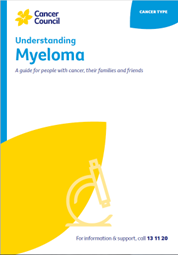Your health care team
Your GP will arrange the first tests to assess your symptoms. If these tests do not rule out cancer, you will usually be referred to a specialist, such as a haematologist. In some regional areas, people may see a medical oncologist instead. The specialist will arrange further tests.
If myeloma is diagnosed, the specialist will consider treatment options (some myeloma may not need treatment). Often these will be discussed with other health professionals at what is known as a multidisciplinary team (MDT) meeting. During and after treatment, you will see a range of health professionals who specialise in different aspects of your care.
To find cancer specialists, multidisciplinary teams and hospitals in NSW or ACT, you can visit the NSW Government website CanRefer.
Health professionals you may see
| GP | assists you with treatment decisions and works in partnership with your specialists in providing ongoing care |
| haematologist* | diagnoses and treats diseases of the bone marrow, blood and lymphatic system; prescribes chemotherapy and other drug therapies |
| radiation oncologist* | treats cancer by prescribing and overseeing a course of radiation therapy |
| pathologist* | examines cells and tissue samples to determine the type and extent of the myeloma |
| cancer care coordinator | coordinates your care, liaises with other members of the MDT and supports you and your family throughout treatment; care may also be coordinated by a clinical nurse consultant (CNC) or clinical nurse specialist (CNS) |
| nurse | administers drugs and provides care, information and support throughout treatment |
| pain management team | work together to treat pain, particularly if it is difficult to control |
| dietitian | helps with nutrition concerns and recommends changes to diet during treatment and recovery |
| social worker | links you to support services and helps you with emotional, practical and financial issues |
| physiotherapist | helps with restoring movement and mobility, and preventing further injury |
| occupational therapist | assists in adapting your living and working environment to help you resume usual activities after treatment |
| counsellor, psychologist | help you understand and manage your emotional response to diagnosis and treatment |
→ READ MORE: Myeloma treatment
More resources
Dr Ian Bilmon, Haematologist, Westmead Hospital and The Sydney Adventist Hospital; Martin Boling, Consumer; Catherine Bowley, Myeloma Support Nurse, Myeloma Australia; Dr Samuel Dickson, Radiation Oncologist, Calvary Mater Newcastle; Rachelle Frith, Clinical Nurse Consultant, Haematology, Prince of Wales Hospital; Dr Wojt Janowski, Haematologist, Calvary Mater Newcastle; Yvonne King, 13 11 20 Consultant, Cancer Council NSW.
View the Cancer Council NSW editorial policy.
View all publications or call 13 11 20 for free printed copies.
Need to talk?
Support services
Coping with cancer?
Speak to a health professional or to someone who has been there, or find a support group or forum
Need legal and financial assistance?
Pro bono services, financial and legal assistance, and no interest loans
Cancer information
Patient rights and responsibilities
What you can reasonably expect from your health care providers
View our publications
Guides and fact sheets for people with cancer, their families and friends

